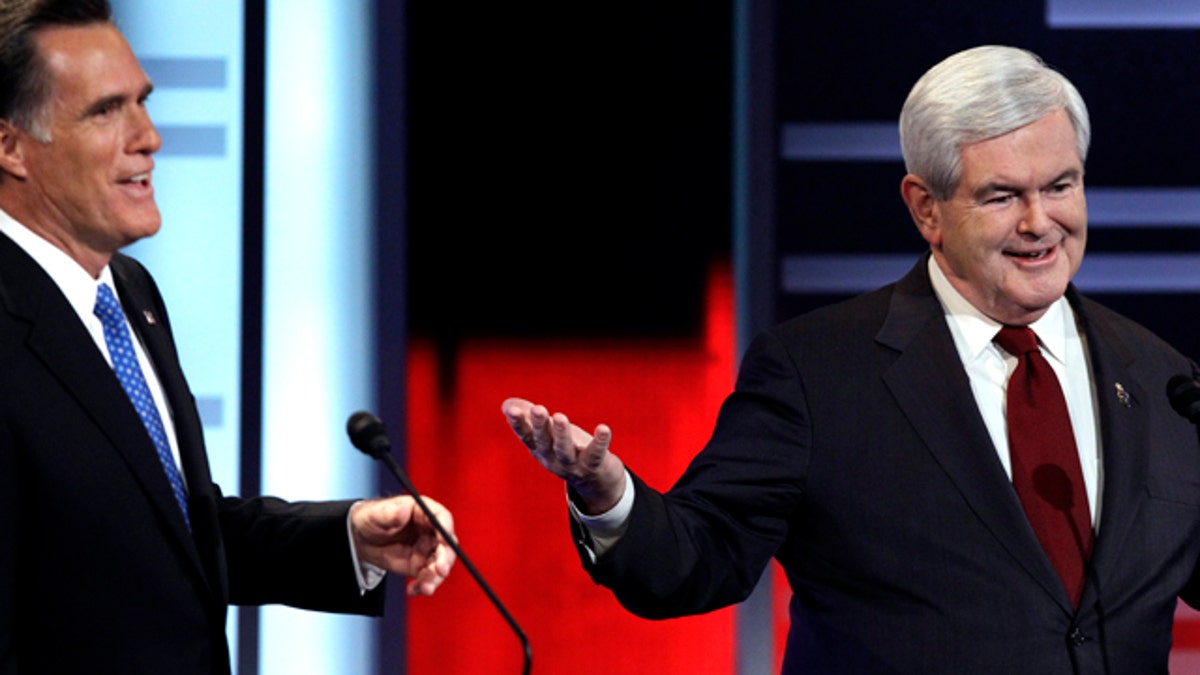
Dec. 10: Mitt Romney, left, and Newt Gingrich, square off in GOP debate. (AP)
Newt Gingrich no longer has the luxury of playing the uniter in the Republican presidential field.
The former House speaker, after spending past debates dismissing “gotcha” questions from moderators and urging his fellow competitors to stop attacking each other, had to spend his first debate as the field’s clear front-runner taking on every one of his competitors.
And nothing – including Gingrich’s history of infidelity – was off the table.
The candidate, whose poll numbers have surged in just the past few weeks, was the prime target for the five other Republicans on stage Saturday night in Iowa, just three weeks before that state’s leadoff caucuses. His long record proved to be as much a liability as an asset, with the rest of the field digging back and citing his comments from the early ‘90s, as well as Gingrich’s more controversial statements from this year’s presidential campaign, in their arguments.
But the debate was also a critical opportunity for former Massachusetts Gov. Mitt Romney to regain his footing, and distinguish himself. Perhaps one of the most telling moments came when Romney scolded Gingrich for a statement a day earlier in which he said the Palestinians are an “invented” people.
Romney suggested that the statement could inflame tensions in the Middle East and that Gingrich might have been getting ahead of the Israelis in making such a remark. Then in a bid to underscore a key character difference between himself and Gingrich, Romney claimed he would not speak so spontaneously as commander-in-chief.
“If I’m president of the United States, I will exercise sobriety, care, stability,” Romney said. “I’m not a bomb-thrower, rhetorically or literally.”
Gingrich, though, defended the remark and used it as an example to tout his tell-it-like-it-is style.
“I’m a Reaganite. I’m proud to be a Reaganite. I will tell the truth, even if it’s at the risk of causing some confusion sometimes with the timid,” Gingrich said.
The two tangled over Gingrich’s background as well as his style.
Romney distinguished himself by pointing out, aside from his term as governor, that he spent most of his life in the private sector.
But in one of the debate’s livelier moments, Gingrich sharply noted that Romney didn’t necessarily have that experience by choice.
“Let’s be candid. The only reason you didn’t become a career politician is you lost to Teddy Kennedy in 1994,” Gingrich said, referring to Romney’s failed bid against the late senator.
“It’s a bit much. You’d have been a 17-year career politician by now if you won,” he said.
Romney conceded “that’s probably true,” just like he’d “have been a football star” if he was allowed in the NFL.
“But I spent my life in the private sector,” Romney said. “Losing to Teddy Kennedy was probably the best thing I could have done for preparing me for the job I’m seeking. … We don’t need folks who are lifetime Washington people.”
Later in the debate, Gingrich’s character was called into question when his opponents were asked whether infidelity should matter for a political candidate.
Perry said it should. “If you will cheat on your wife, if you will cheat on your spouse, then why wouldn’t you cheat on your business partner?” he said.
Gingrich said he thinks it is a “real issue” for voters that they will have to consider.
He added: "I've made mistakes at times and I've had to go to God for forgiveness."
Aside from the former speaker’s comments on the Middle East peace process, his recent comments on illegal immigration also came under the microscope Saturday. At the last debate, Gingrich said some illegal immigrants should be allowed to stay in the country – he later clarified that the plan would only apply to some illegal immigrants who have been here 25 years or more.
Gingrich stressed Saturday that the plan is not “amnesty” and that these immigrants would not have a path to citizenship.
But Romney described it as a “form of amnesty,” and one that would “create another magnet that draws people into our country illegally.”
Romney said illegal immigrants should be given a transition time to return home and then “get in line at the back of the line” – though Romney has previously said he wouldn’t launch a national effort to find and deport every illegal immigrant.
Gingrich also defended against attacks from Texas Rep. Ron Paul and Minnesota Rep. Michele Bachmann. Under questioning from Paul, Gingrich said he had never lobbied for Freddie Mac, a quasi-government agency that paid him at least $1.6 million to provide strategic advice. Paul shot back, "It's the taxpayers' money, though. We were bailing them out."
The debate on ABC News was the 12th since the long campaign began, and the first since Herman Cain's candidacy imploded after allegations of sexual harassment and an extra-marital affair.
The six contenders split down the middle on legislation making its way toward a year-end vote in Congress to extend a Social Security payroll tax into 2012.
Romney, Gingrich and Paul said they favored it. Bachmann, Texas Gov., Rick Perry and former Pennsylvania Sen. Rick Santorum said they opposed the measure.
Bachmann also criticized Gingrich for first supporting a requirement for individuals to purchase health insurance in 1993. She folded Romney into her attack, saying he had pushed successfully for a state health care law as Massachusetts governor that contained an individual mandate.
In rebuttal, Gingrich said the mandate he supported was a conservative alternative to President Bill Clinton's national health care plan.
"It's now clear the individual mandate is unconstitutional," he said.
The debate also brought out an amusing moment between Romney and Perry.
Perry accused Romney of once writing that the Massachusetts health care law should be a “model” for the country.
“It’s simply wrong,” Romney said, and then extended his hand to Perry. “I’ll tell you what. 10,000 bucks. 10,000-dollar bet.”
Perry responded, “I’m not in the betting business.”
The Associated Press contributed to this report.










































